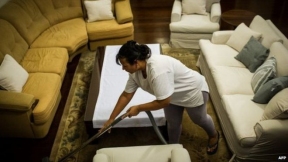
By: Ashmar Mandou
Domestic workers rejoiced on Friday, Aug. 12th after Governor Bruce Rauner signed House Bill 1288 into law granting Illinois domestic workers the same protections as other workers, such as equal treatment, fair wages, sexual harassment, and a day of rest for workers employed for at least 20 hours a week.
The Fair Labor Standards Act excluded domestic workers, majority of whom were women of color and immigrant women. Home cleaners, nannies, and care workers all celebrated the five-year campaign led by the Illinois Domestic Workers Coalition culminating in HB 1288 becoming state law. HB 1288, the Domestic Workers’ Bill of Rights was sponsored by Representative Elizabeth Hernandez. HB 1288 amends the following Acts that previously excluded household employees: The Illinois Human Rights Act, The Illinois Minimum Wage Act, The One Day Rest in Seven Act, and The Wages of Women and Minors Act. The definition of domestic workers includes employees that perform duties that encompass: housekeeping, caregiving, nanny, chauffer, and home management services. “Finally, some of the hardest working people in the state will receive the dignity and respect they deserve of their work environment. Domestic workers are important in today’s economy but are often exploited because of the lack of protections making it difficult to support their own families. I’m proud that Illinois moved forward in a bipartisan effort to ensure domestic workers—those who care for the elderly, the disabled, and our homes will receive no less than minimum wage, receive at least one day off a week and have protection against sexual harassment,” states Rep. Hernandez.

HB 1288 improves the working conditions and lives of 35,000 domestic workers in Illinois. Domestic workers play a vital role in the Illinois economy, working to endure the health and prosperity of Illinois families. “When I started working as a nanny, I worked from 6a.m., to 5p.m., earning $12 a day,” said Maria Esther Bolaños. “With the signing of this law, we have come out of the shadows. Domestic Workers are finally visible in society, with equal protections under the law. Together, we are going to make history.”
Other domestic workers shared their stories on Friday during the celebration. Polish domestic worker Magdalena Zylinska reflected on her experience working alongside the campaign. “This is one step in a long process. After so many years of struggling to get by, and so many trips to Springfield, I can finally say that we won. Now we need to make sure that all domestic workers know their rights, and that employers know their responsibilities under the new law.”

States Strategy Organizer at the National Domestic Workers Alliance Yomara Velez states, “The Illinois Domestic Workers Bill of Rights marks the seventh state win of the domestic workers movement, which had its first legislative victory in New York in 2010. We are another state closer to ensuring that all domestic workers, who care for our children, our loved ones living with disabilities, our aging parents, and our homes, have respect, dignity, and the support to take care of their own families.”








